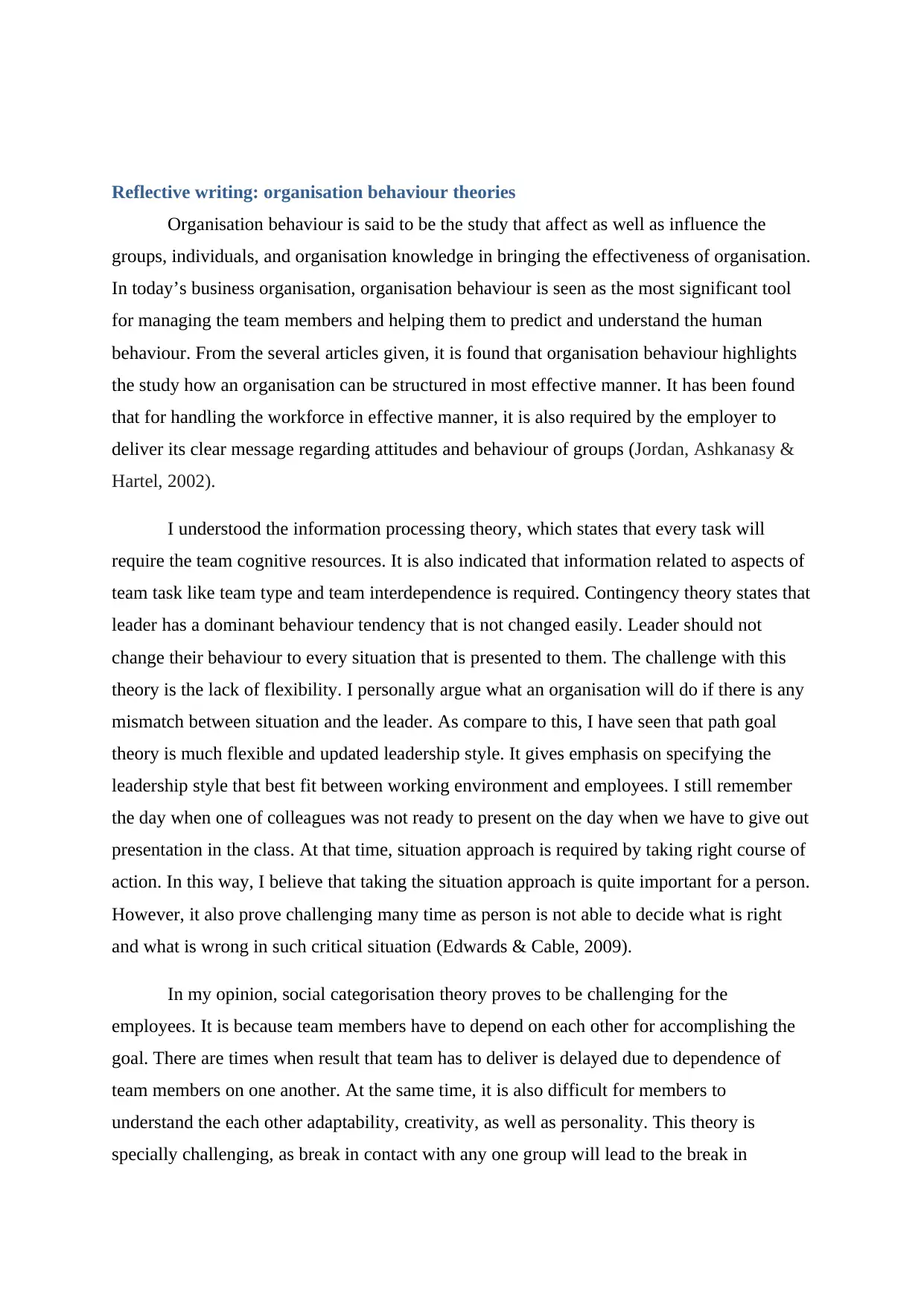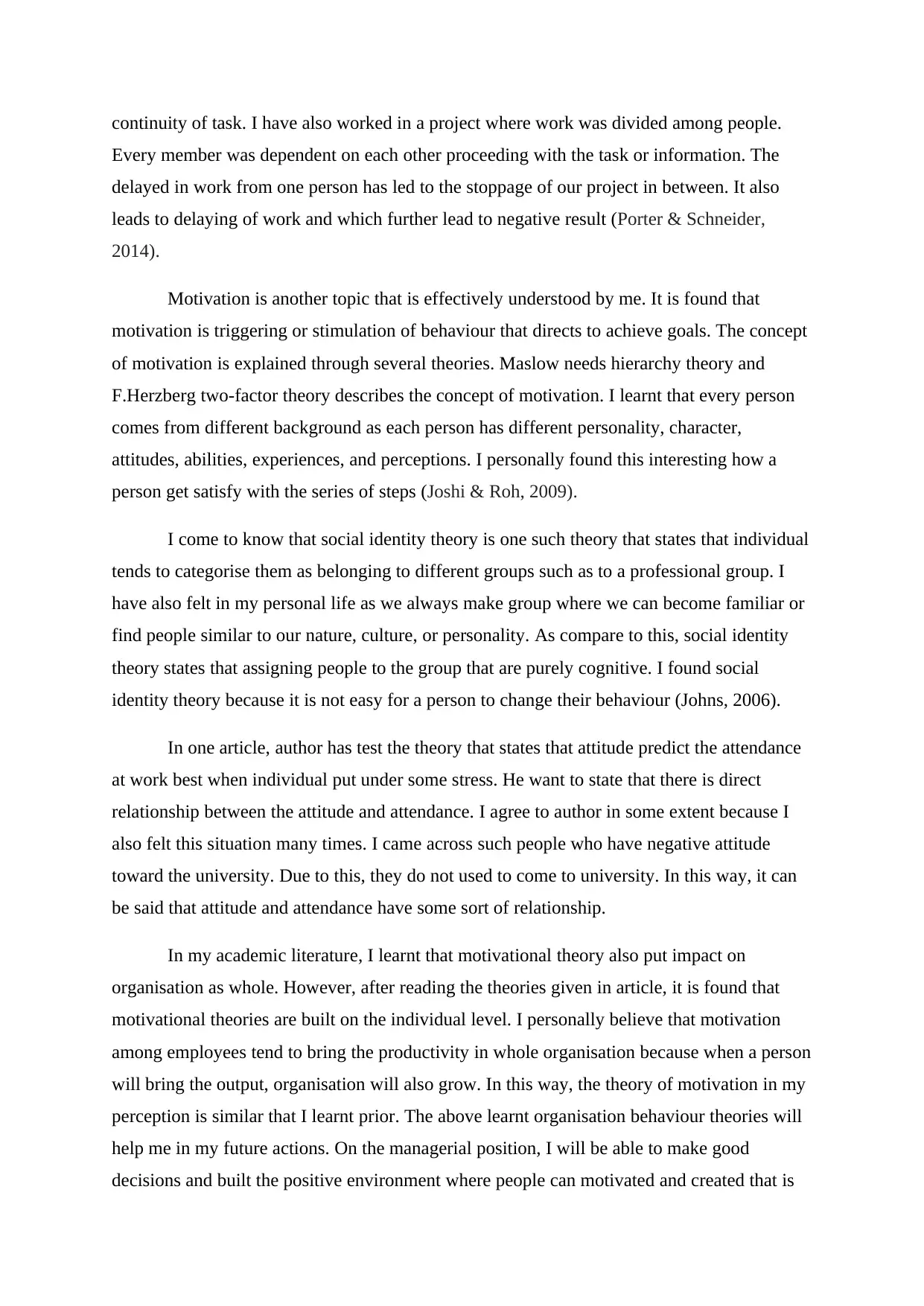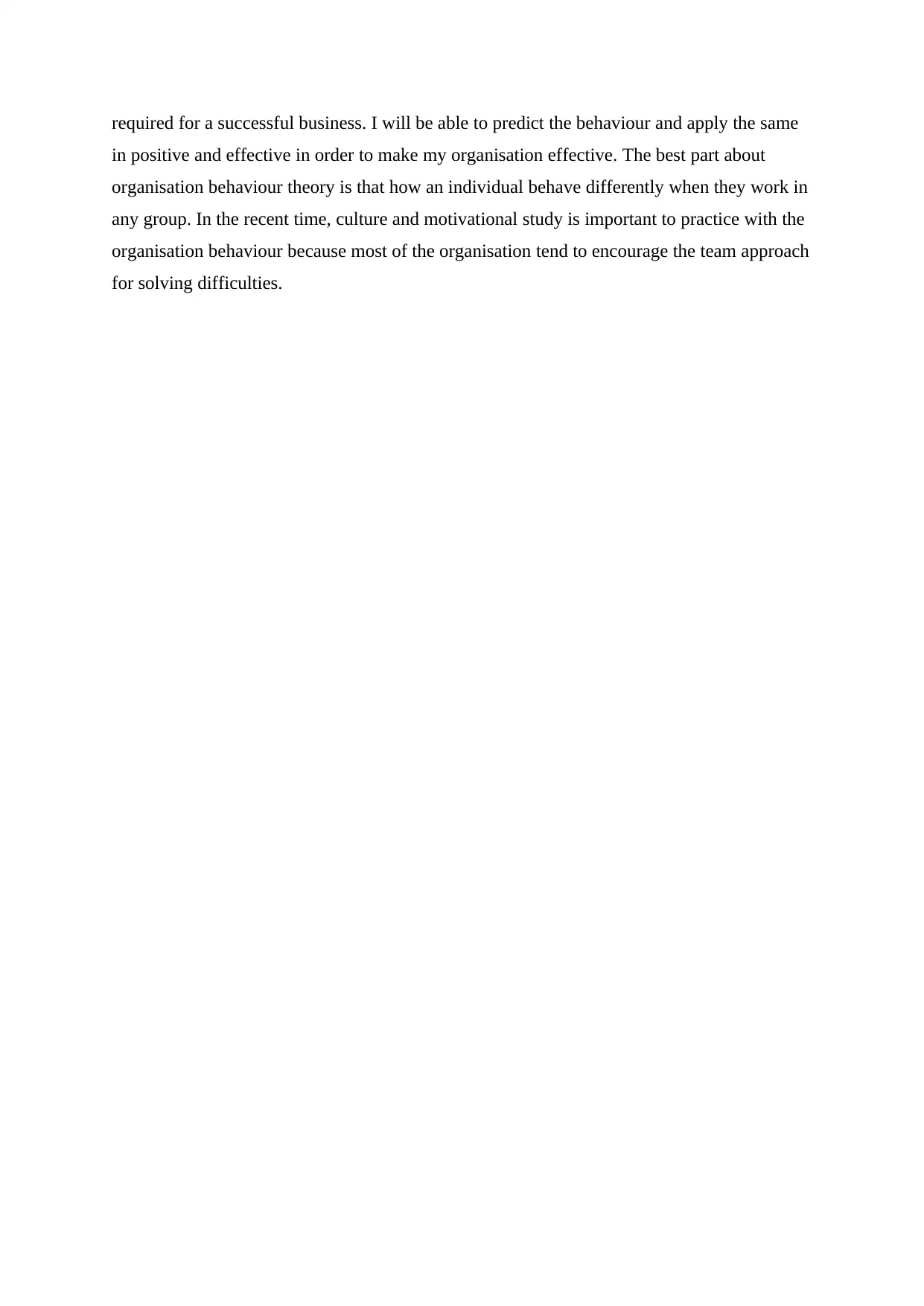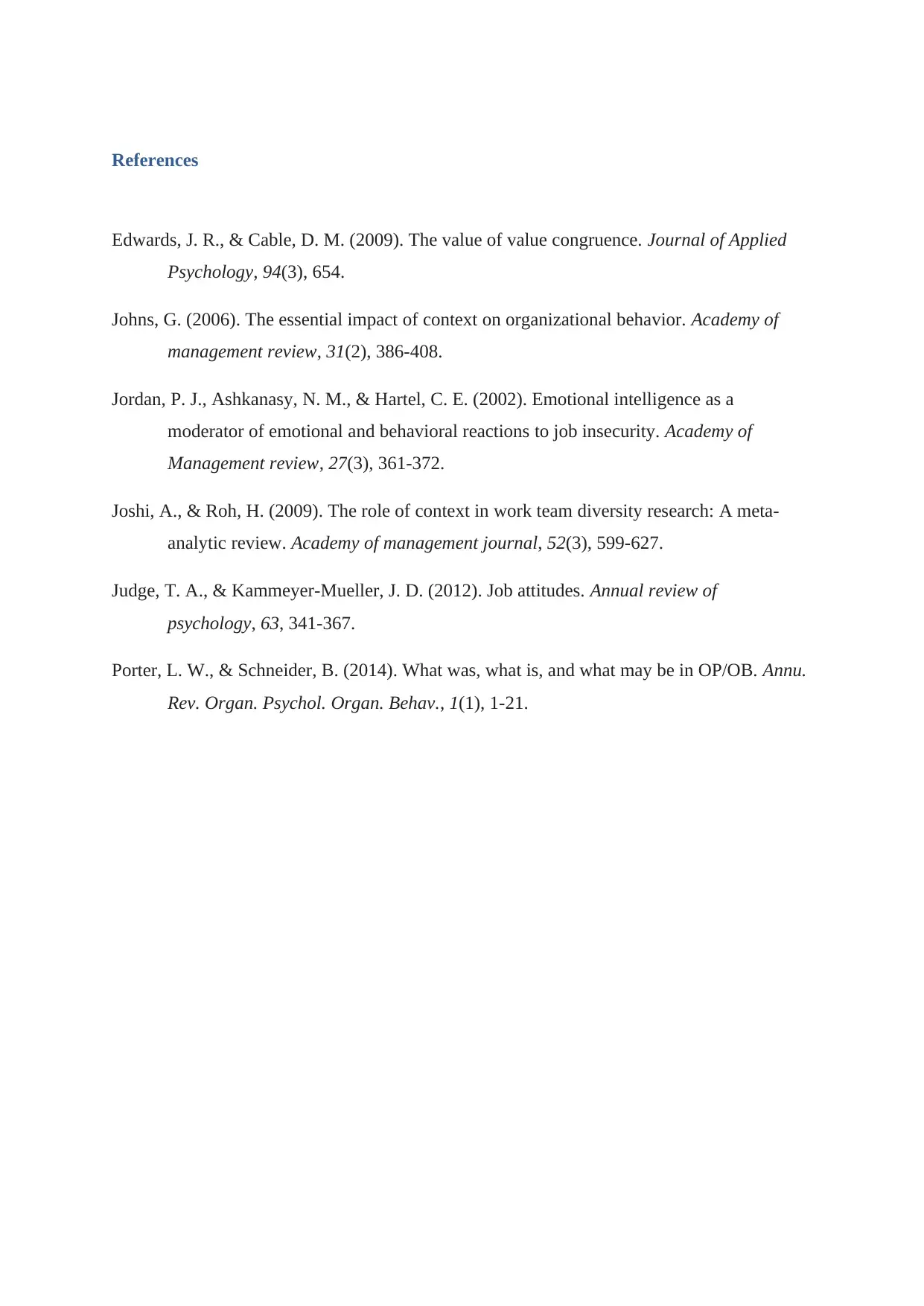Reflective Writing on Organisation Behaviour Theories and Practices
VerifiedAdded on 2022/08/12
|5
|1276
|11
Journal and Reflective Writing
AI Summary
This reflective writing assignment explores various organisation behaviour (OB) theories, frameworks, and practices. The author reflects on several key concepts covered in the first four weeks of the unit, including information processing theory, contingency theory, and path goal theory. The author discusses the challenges and benefits of different leadership styles, such as the lack of flexibility in contingency theory versus the adaptability of path goal theory. The writing also delves into social categorisation theory, highlighting its complexities in team dynamics and dependence. Furthermore, the assignment examines motivation theories, specifically Maslow's hierarchy of needs and Herzberg's two-factor theory, and their impact on individual and organisational performance. The author connects these theories to personal experiences, demonstrating a practical understanding of how OB principles influence behaviour and decision-making in professional settings. The author concludes by emphasising the importance of these theories for future managerial roles and building positive work environments.

qwertyuiopasdfghjklzxcvbnmqw
ertyuiopasdfghjklzxcvbnmqwert
yuiopasdfghjklzxcvbnmqwertyui
opasdfghjklzxcvbnmqwertyuiop
asdfghjklzxcvbnmqwertyuiopasd
fghjklzxcvbnmqwertyuiopasdfgh
jklzxcvbnmqwertyuiopasdfghjkl
zxcvbnmqwertyuiopasdfghjklzxc
vbnmqwertyuiopasdfghjklzxcvb
nmqwertyuiopasdfghjklzxcvbnm
qwertyuiopasdfghjklzxcvbnmqw
ertyuiopasdfghjklzxcvbnmqwert
yuiopasdfghjklzxcvbnmqwertyui
opasdfghjklzxcvbnmqwertyuiop
asdfghjklzxcvbnmqwertyuiopasd
fghjklzxcvbnmqwertyuiopasdfgh
jklzxcvbnmrtyuiopasdfghjklzxcv
Management
ertyuiopasdfghjklzxcvbnmqwert
yuiopasdfghjklzxcvbnmqwertyui
opasdfghjklzxcvbnmqwertyuiop
asdfghjklzxcvbnmqwertyuiopasd
fghjklzxcvbnmqwertyuiopasdfgh
jklzxcvbnmqwertyuiopasdfghjkl
zxcvbnmqwertyuiopasdfghjklzxc
vbnmqwertyuiopasdfghjklzxcvb
nmqwertyuiopasdfghjklzxcvbnm
qwertyuiopasdfghjklzxcvbnmqw
ertyuiopasdfghjklzxcvbnmqwert
yuiopasdfghjklzxcvbnmqwertyui
opasdfghjklzxcvbnmqwertyuiop
asdfghjklzxcvbnmqwertyuiopasd
fghjklzxcvbnmqwertyuiopasdfgh
jklzxcvbnmrtyuiopasdfghjklzxcv
Management
Paraphrase This Document
Need a fresh take? Get an instant paraphrase of this document with our AI Paraphraser

Reflective writing: organisation behaviour theories
Organisation behaviour is said to be the study that affect as well as influence the
groups, individuals, and organisation knowledge in bringing the effectiveness of organisation.
In today’s business organisation, organisation behaviour is seen as the most significant tool
for managing the team members and helping them to predict and understand the human
behaviour. From the several articles given, it is found that organisation behaviour highlights
the study how an organisation can be structured in most effective manner. It has been found
that for handling the workforce in effective manner, it is also required by the employer to
deliver its clear message regarding attitudes and behaviour of groups (Jordan, Ashkanasy &
Hartel, 2002).
I understood the information processing theory, which states that every task will
require the team cognitive resources. It is also indicated that information related to aspects of
team task like team type and team interdependence is required. Contingency theory states that
leader has a dominant behaviour tendency that is not changed easily. Leader should not
change their behaviour to every situation that is presented to them. The challenge with this
theory is the lack of flexibility. I personally argue what an organisation will do if there is any
mismatch between situation and the leader. As compare to this, I have seen that path goal
theory is much flexible and updated leadership style. It gives emphasis on specifying the
leadership style that best fit between working environment and employees. I still remember
the day when one of colleagues was not ready to present on the day when we have to give out
presentation in the class. At that time, situation approach is required by taking right course of
action. In this way, I believe that taking the situation approach is quite important for a person.
However, it also prove challenging many time as person is not able to decide what is right
and what is wrong in such critical situation (Edwards & Cable, 2009).
In my opinion, social categorisation theory proves to be challenging for the
employees. It is because team members have to depend on each other for accomplishing the
goal. There are times when result that team has to deliver is delayed due to dependence of
team members on one another. At the same time, it is also difficult for members to
understand the each other adaptability, creativity, as well as personality. This theory is
specially challenging, as break in contact with any one group will lead to the break in
Organisation behaviour is said to be the study that affect as well as influence the
groups, individuals, and organisation knowledge in bringing the effectiveness of organisation.
In today’s business organisation, organisation behaviour is seen as the most significant tool
for managing the team members and helping them to predict and understand the human
behaviour. From the several articles given, it is found that organisation behaviour highlights
the study how an organisation can be structured in most effective manner. It has been found
that for handling the workforce in effective manner, it is also required by the employer to
deliver its clear message regarding attitudes and behaviour of groups (Jordan, Ashkanasy &
Hartel, 2002).
I understood the information processing theory, which states that every task will
require the team cognitive resources. It is also indicated that information related to aspects of
team task like team type and team interdependence is required. Contingency theory states that
leader has a dominant behaviour tendency that is not changed easily. Leader should not
change their behaviour to every situation that is presented to them. The challenge with this
theory is the lack of flexibility. I personally argue what an organisation will do if there is any
mismatch between situation and the leader. As compare to this, I have seen that path goal
theory is much flexible and updated leadership style. It gives emphasis on specifying the
leadership style that best fit between working environment and employees. I still remember
the day when one of colleagues was not ready to present on the day when we have to give out
presentation in the class. At that time, situation approach is required by taking right course of
action. In this way, I believe that taking the situation approach is quite important for a person.
However, it also prove challenging many time as person is not able to decide what is right
and what is wrong in such critical situation (Edwards & Cable, 2009).
In my opinion, social categorisation theory proves to be challenging for the
employees. It is because team members have to depend on each other for accomplishing the
goal. There are times when result that team has to deliver is delayed due to dependence of
team members on one another. At the same time, it is also difficult for members to
understand the each other adaptability, creativity, as well as personality. This theory is
specially challenging, as break in contact with any one group will lead to the break in

continuity of task. I have also worked in a project where work was divided among people.
Every member was dependent on each other proceeding with the task or information. The
delayed in work from one person has led to the stoppage of our project in between. It also
leads to delaying of work and which further lead to negative result (Porter & Schneider,
2014).
Motivation is another topic that is effectively understood by me. It is found that
motivation is triggering or stimulation of behaviour that directs to achieve goals. The concept
of motivation is explained through several theories. Maslow needs hierarchy theory and
F.Herzberg two-factor theory describes the concept of motivation. I learnt that every person
comes from different background as each person has different personality, character,
attitudes, abilities, experiences, and perceptions. I personally found this interesting how a
person get satisfy with the series of steps (Joshi & Roh, 2009).
I come to know that social identity theory is one such theory that states that individual
tends to categorise them as belonging to different groups such as to a professional group. I
have also felt in my personal life as we always make group where we can become familiar or
find people similar to our nature, culture, or personality. As compare to this, social identity
theory states that assigning people to the group that are purely cognitive. I found social
identity theory because it is not easy for a person to change their behaviour (Johns, 2006).
In one article, author has test the theory that states that attitude predict the attendance
at work best when individual put under some stress. He want to state that there is direct
relationship between the attitude and attendance. I agree to author in some extent because I
also felt this situation many times. I came across such people who have negative attitude
toward the university. Due to this, they do not used to come to university. In this way, it can
be said that attitude and attendance have some sort of relationship.
In my academic literature, I learnt that motivational theory also put impact on
organisation as whole. However, after reading the theories given in article, it is found that
motivational theories are built on the individual level. I personally believe that motivation
among employees tend to bring the productivity in whole organisation because when a person
will bring the output, organisation will also grow. In this way, the theory of motivation in my
perception is similar that I learnt prior. The above learnt organisation behaviour theories will
help me in my future actions. On the managerial position, I will be able to make good
decisions and built the positive environment where people can motivated and created that is
Every member was dependent on each other proceeding with the task or information. The
delayed in work from one person has led to the stoppage of our project in between. It also
leads to delaying of work and which further lead to negative result (Porter & Schneider,
2014).
Motivation is another topic that is effectively understood by me. It is found that
motivation is triggering or stimulation of behaviour that directs to achieve goals. The concept
of motivation is explained through several theories. Maslow needs hierarchy theory and
F.Herzberg two-factor theory describes the concept of motivation. I learnt that every person
comes from different background as each person has different personality, character,
attitudes, abilities, experiences, and perceptions. I personally found this interesting how a
person get satisfy with the series of steps (Joshi & Roh, 2009).
I come to know that social identity theory is one such theory that states that individual
tends to categorise them as belonging to different groups such as to a professional group. I
have also felt in my personal life as we always make group where we can become familiar or
find people similar to our nature, culture, or personality. As compare to this, social identity
theory states that assigning people to the group that are purely cognitive. I found social
identity theory because it is not easy for a person to change their behaviour (Johns, 2006).
In one article, author has test the theory that states that attitude predict the attendance
at work best when individual put under some stress. He want to state that there is direct
relationship between the attitude and attendance. I agree to author in some extent because I
also felt this situation many times. I came across such people who have negative attitude
toward the university. Due to this, they do not used to come to university. In this way, it can
be said that attitude and attendance have some sort of relationship.
In my academic literature, I learnt that motivational theory also put impact on
organisation as whole. However, after reading the theories given in article, it is found that
motivational theories are built on the individual level. I personally believe that motivation
among employees tend to bring the productivity in whole organisation because when a person
will bring the output, organisation will also grow. In this way, the theory of motivation in my
perception is similar that I learnt prior. The above learnt organisation behaviour theories will
help me in my future actions. On the managerial position, I will be able to make good
decisions and built the positive environment where people can motivated and created that is
⊘ This is a preview!⊘
Do you want full access?
Subscribe today to unlock all pages.

Trusted by 1+ million students worldwide

required for a successful business. I will be able to predict the behaviour and apply the same
in positive and effective in order to make my organisation effective. The best part about
organisation behaviour theory is that how an individual behave differently when they work in
any group. In the recent time, culture and motivational study is important to practice with the
organisation behaviour because most of the organisation tend to encourage the team approach
for solving difficulties.
in positive and effective in order to make my organisation effective. The best part about
organisation behaviour theory is that how an individual behave differently when they work in
any group. In the recent time, culture and motivational study is important to practice with the
organisation behaviour because most of the organisation tend to encourage the team approach
for solving difficulties.
Paraphrase This Document
Need a fresh take? Get an instant paraphrase of this document with our AI Paraphraser

References
Edwards, J. R., & Cable, D. M. (2009). The value of value congruence. Journal of Applied
Psychology, 94(3), 654.
Johns, G. (2006). The essential impact of context on organizational behavior. Academy of
management review, 31(2), 386-408.
Jordan, P. J., Ashkanasy, N. M., & Hartel, C. E. (2002). Emotional intelligence as a
moderator of emotional and behavioral reactions to job insecurity. Academy of
Management review, 27(3), 361-372.
Joshi, A., & Roh, H. (2009). The role of context in work team diversity research: A meta-
analytic review. Academy of management journal, 52(3), 599-627.
Judge, T. A., & Kammeyer-Mueller, J. D. (2012). Job attitudes. Annual review of
psychology, 63, 341-367.
Porter, L. W., & Schneider, B. (2014). What was, what is, and what may be in OP/OB. Annu.
Rev. Organ. Psychol. Organ. Behav., 1(1), 1-21.
Edwards, J. R., & Cable, D. M. (2009). The value of value congruence. Journal of Applied
Psychology, 94(3), 654.
Johns, G. (2006). The essential impact of context on organizational behavior. Academy of
management review, 31(2), 386-408.
Jordan, P. J., Ashkanasy, N. M., & Hartel, C. E. (2002). Emotional intelligence as a
moderator of emotional and behavioral reactions to job insecurity. Academy of
Management review, 27(3), 361-372.
Joshi, A., & Roh, H. (2009). The role of context in work team diversity research: A meta-
analytic review. Academy of management journal, 52(3), 599-627.
Judge, T. A., & Kammeyer-Mueller, J. D. (2012). Job attitudes. Annual review of
psychology, 63, 341-367.
Porter, L. W., & Schneider, B. (2014). What was, what is, and what may be in OP/OB. Annu.
Rev. Organ. Psychol. Organ. Behav., 1(1), 1-21.
1 out of 5
Related Documents
Your All-in-One AI-Powered Toolkit for Academic Success.
+13062052269
info@desklib.com
Available 24*7 on WhatsApp / Email
![[object Object]](/_next/static/media/star-bottom.7253800d.svg)
Unlock your academic potential
Copyright © 2020–2026 A2Z Services. All Rights Reserved. Developed and managed by ZUCOL.




